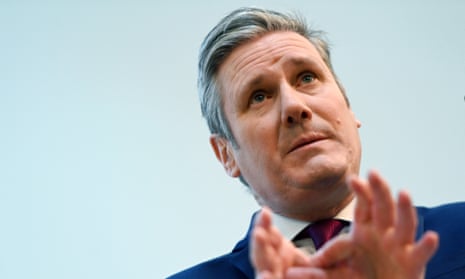Labour will today announce ambitious plans to create a country that can “live well with Covid” without the need for future harsh restrictions, as it seeks to prevent Boris Johnson claiming credit for his record on the virus.
Keir Starmer said he wanted people to be able to “live their lives as normal” and never again face “tough restrictions on our lives, our livelihoods and our liberties”.
Shadow health secretary Wes Streeting’s 10-point plan includes measures to raise sick pay, improve testing, share vaccines worldwide and transform social care.
It comes as Johnson and his ministers are desperately attempting to shore up the prime minister’s leadership, amid growing calls for him to resign over the “partygate” controversy, by talking up his handling of the pandemic and the vaccine programme at every opportunity.
With the government preparing to ease many Covid restrictions when plan B measures are reviewed on 26 January, Labour is determined to remind people of the Tories’ “chaotic” performance over PPE, testing and other Covid issues, while positioning itself as ready to keep life as normal as possible in the event of future surges.
In a speech to the Fabian Society yesterday, Starmer said he was “convinced that a swifter response” could have reduced the Covid death toll which has reached at least 150,000. He said Labour’s first task in government would be to “clear up the mess that Tories have made of the NHS”.
Streeting’s 10-point plan would raise statutory sick pay, making it available to all workers, including the self-employed and those on low wages currently cut out by the lower-earnings limit for eligibility.
The party says it will scrap the qualifying time for sick pay so that workers can access it immediately, reducing the pressure people feel to work while unwell or potentially unwell.
Streeting says his party will also build a “sovereign capability” to ensure a supply of test kits made in Britain, to mitigate against any global shortage, and champion new ideas in testing technology.
In addition, Labour plans to use NHS volunteers in a massive nationwide effort to reach the 650,000 as yet unvaccinated people at highest risk of severe disease from Covid with individual communication, in-person visits and mobile vaccination clinics.

Streeting said: “We’re not out of the woods with Covid-19. The virus will change and adapt, and we need to learn to live well with it. For the government, living with Covid is just an empty slogan with no plan. For some of the fanatics on the Conservative backbenches, living with Covid means letting the virus rip. Both positions are highly irresponsible.
“If we are to learn to live well with Covid, we need to be prepared. Labour’s plan will put Britain on the front foot and secure our lives, livelihoods and liberties.”
Streeting added that the UK needed to play its part in vaccinating the rest of the world by sharing surplus vaccines. Also that it must protect education by shoring up testing supplies for children and fitting schools with ventilation systems.
The latest phase of the pandemic has seen Covid-19 infections rising in the north of England but “plateauing” in the south, Susan Hopkins, the UK Health Security Agency’s chief medical adviser, said yesterday.
About one in 15 people in England have the virus, Office for National Statistics figures show, and admissions to hospital are slowing down to just under 2,000 patients a day.
Yet the NHS remains under “a lot of pressure”, Hopkins said, with more than 15,000 Covid patients in hospital in England – only slightly fewer than in the first 2020 wave – and many NHS trusts having halted elective surgery.
Last week, the Scientific Advisory Group for Emergencies (Sage) said there was likely to be a second Omicron wave in the early summer, with their modelling predicting up to 4,000 admissions to hospital a day, with other projections suggesting 1,000 admissions.
Tomorrow, 16 and 17-year-olds will be able to book booster jabs online, in the latest phase of the vaccination campaign.
Sajid Javid, England’s health secretary, is expected to recommend that the requirement for people to provide proof of vaccination or a negative test to enter large events or nightclubs in England ends when plan B restrictions are reviewed later this month.
In addition, he is under pressure from MPs in his party to end the “work from home” guidance, which many believe is doing disproportionate damage to the economy and town and city centres. The requirement to wear masks in enclosed places may be left as the sole measure in place after the review.
Last week, as Johnson faced a chorus of demands for his resignation from Tory MPs and opposition parties, cabinet ministers went out of their way to praise his “outstanding” leadership over the pandemic, insisting he had got all the “big calls” right, including resisting demands from many scientists at Christmas for tighter restrictions.
He and the Tories received a huge bounce in the polls after the introduction of the vaccine programme, but Labour is determined to prevent a positive overall narrative developing about how the Johnson government dealt with Covid-19 in comparison with other countries in Europe and across the world.
